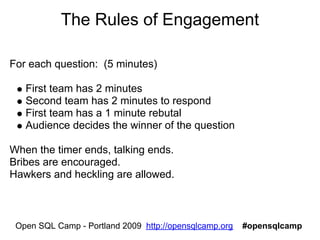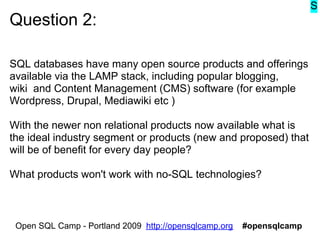SQL v No SQL
- 1. SQL v No-SQL The Great Debate Open SQL Camp - Portland 2009 http://opensqlcamp.org #opensqlcamp
- 2. The Blue "SQL" Team s D Brian Aker (Drizzle) Js JD Duncan (MySQL) Mas Monty Widenius (MariaDB / ODBA) s P Selena Deckelmann (PostgreSQL) Others: SQLLite, Ingres, Firebird Open SQL Camp - Portland 2009 http://opensqlcamp.org #opensqlcamp
- 3. The Red "no-SQL" Team n Ca Eric Evans (Cassandra) Hn Joydeep Sen Sarma (Hadoop / Hive) Mn Mike Dirolf (MongoDB) n Co Mike Miller (CouchDB) Others: GAE,SimpleDB,Tokyo,Redis,LucidDB,MonetDB etc Open SQL Camp - Portland 2009 http://opensqlcamp.org #opensqlcamp
- 5. The Blue Team SQL Rules Open SQL Camp - Portland 2009 http://opensqlcamp.org #opensqlcamp
- 6. The Red Team SQL is dead Open SQL Camp - Portland 2009 http://opensqlcamp.org #opensqlcamp
- 7. The Rules of Engagement For each question: (5 minutes) First team has 2 minutes Second team has 2 minutes to respond First team has a 1 minute rebutal Audience decides the winner of the question When the timer ends, talking ends. Bribes are encouraged. Hawkers and heckling are allowed. Open SQL Camp - Portland 2009 http://opensqlcamp.org #opensqlcamp
- 8. Audience Contributions Please submit your questions via Twitter #opensqlcamp #greatdebate Open SQL Camp - Portland 2009 http://opensqlcamp.org #opensqlcamp
- 9. N Question 1: SQL is a standard that most developers know, and most open source relational databases implement in a consistent manner. How are the no-SQL offerings going to provide a more consistent and productive for software developers? What benefits are there for not using SQL in development? Brian Aker is not allowed to re-use Lightning talk material. Open SQL Camp - Portland 2009 http://opensqlcamp.org #opensqlcamp
- 10. S Question 2: SQL databases have many open source products and offerings available via the LAMP stack, including popular blogging, wiki and Content Management (CMS) software (for example Wordpress, Drupal, Mediawiki etc ) With the newer non relational products now available what is the ideal industry segment or products (new and proposed) that will be of benefit for every day people? What products won't work with no-SQL technologies? Open SQL Camp - Portland 2009 http://opensqlcamp.org #opensqlcamp
- 11. S Question 3: Scalability and high availability with relational databases can really suck. This requires a great amount of planning and architecture to implement successfully in large scale environments. What are the strengths you can offer towards the needs for read scalability, write scalability, software upgrades and database maintenance without impacting the user experience? Open SQL Camp - Portland 2009 http://opensqlcamp.org #opensqlcamp
- 12. N Question 4: Transactions form an essential component in many business critical systems including financial and military. How does my bank balance work in an eventually consistent environment? While many systems can survive without the need of database centric consistency, many developers need greater education. How do you educate them for what is best? Open SQL Camp - Portland 2009 http://opensqlcamp.org #opensqlcamp
- 13. Question 5: From the audience Open SQL Camp - Portland 2009 http://opensqlcamp.org #opensqlcamp
- 14. Question 6: From the audience Open SQL Camp - Portland 2009 http://opensqlcamp.org #opensqlcamp
- 15. Question 7: Can SQL and noSQL co-exist happily in one software product offering? Can one be used as meta data or caching for the other? Is data interchangable? Are there any benefits of working together? Are there any arguments for never working together? Open SQL Camp - Portland 2009 http://opensqlcamp.org #opensqlcamp
- 16. Question 8: A great product with a great code base can easily go the way of the dodo if there is not a supportive and active community. What are each product group doing to better gain, retain and utilize the community for maximum benefit? What do you do that other products should? What do other products do that you wish you did? Open SQL Camp - Portland 2009 http://opensqlcamp.org #opensqlcamp
- 17. Question 9: From the audience Open SQL Camp - Portland 2009 http://opensqlcamp.org #opensqlcamp
- 18. Question 10: From the audience Open SQL Camp - Portland 2009 http://opensqlcamp.org #opensqlcamp
- 19. Wrap-up Open SQL Camp - Portland 2009 http://opensqlcamp.org #opensqlcamp
- 20. SQL and no-SQL are really poor descriptions Open SQL Camp - Portland 2009 http://opensqlcamp.org #opensqlcamp
- 21. Relational and non relational. Is RDBMS and AltDB a better description. Open SQL Camp - Portland 2009 http://opensqlcamp.org #opensqlcamp
- 22. Blended Solutions e.g. Calpont/InfiniDB RDBMS SQL interface Column Oriented storage Direct non-SQL access to data as well Open SQL Camp - Portland 2009 http://opensqlcamp.org #opensqlcamp
- 23. Blended Solutions e.g. mod_ndb json interface via apache to NDB Cluster can still use SQL synchronous scalable database Open SQL Camp - Portland 2009 http://opensqlcamp.org #opensqlcamp
- 24. Blended Solutions e.g. drizzle pluggable approach gearman distributed processing map/reduce capabilities memcached Open SQL Camp - Portland 2009 http://opensqlcamp.org #opensqlcamp























